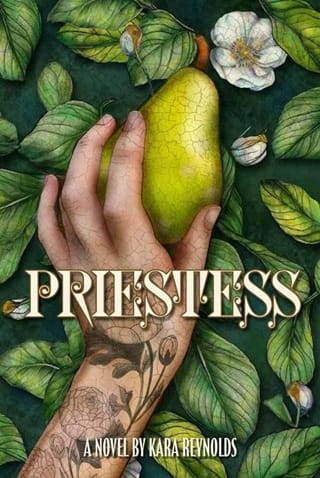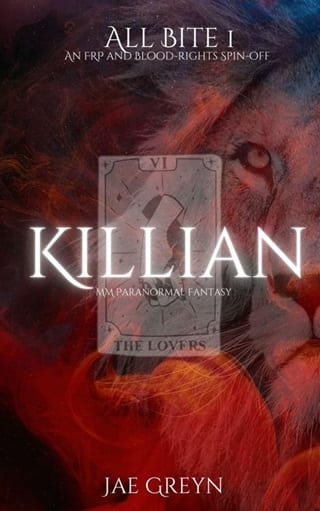91. Promise
I held my skirts to my mouth and screamed.
This was too burdensome.
I was going to spend my second to last afternoon in a spiral of envy and hurt.
My sobs came in heaves.
I made myself try to breathe in between them, as I became lightheaded.
And they were twice as heavy for being made with as little sound as I could make, unsure of who could be out in the hallway, knowing if I fully let go, I would wail.
I had not tied my hair up, letting it dry after a washing that morning and it fell in a veil around me.
This and the pounding in my head prevented me from hearing the door open and shut, my husband coming to kneel next to me on the floor.
“Edith. Edith,”
he urged, his right arm around me, his left hand parting my hair, tucking it behind each ear.
“Edith, please.
What is it? You worry me.
Are you hurt?”
I kept my hands over my face and shook my head.
“Did someone upset you?”
“No,”
I whined, catching my breath.
He took my wrists in the capable fingers of his left hand and pulled my hands away from my face.
His cheeks were ruddy with that morning’s exercises and there was dust and sweat on him.
His well-shaped eyebrows were raised, a half frown on his mouth.
“Edith, you are worrying me.
Please.
What is it?”
I took a shaky breath.
“Do— Do you— Do you have time to speak—”
“I have cancelled the rest of the day.”
Helena’s guess had been correct.
It was hard to speak, but I tried.
“Have you eaten?”
“Yes, quickly,”
he replied, still holding my wrists.
“I wanted to see if you were still in the keep.
I need to bathe, but would you like to do something with me this afternoon?”
“I would,”
I whispered.
“Good.
Now tell me what has caused you such grief.”
“I wish to tell you of my first marriage.”
He moved to sit down, left forearm propped on his raised knee, his right leg stretched out, his right arm still around me.
“I have wanted to ask you, but I did not want to bring up old pain.”
I felt some of the pressure in my head and chest lessen from him sitting next to me, in the space between the desk and the end of our bed, our backs leaning against the desk.
Closing my eyes, I began and I began at the worst of it.
“Do you know what boxing is? In Rodwin’s faith?”
“Oh, wife.”
I nodded.
There was a tightness in his face.
“I did not think it was common.”
“It is, especially in the cities where the king and his clergy have the most influence, no more so than its capital.
I grew up and was married in Apollon.”
“And he— he had that done to you?”
“He and my parents before him.”
He turned away from me.
He lifted his right arm from around me and took my left hand in his right, one finger stroking my wedding band.
He leaned his head towards mine, the side of his face brushing over my temple.
Softly, he said, “Tell me all that it entails.
So that I know.”
I explained that willful children and women were made, first by their parents and then their local magistrates and priests, to lie down in a box for days at a time in their church, at the altar of Rodwin, after any especially grievous transgression that could not be punished by the law, though Rodwin and the courts of Perpatane were much interwoven.
Parishioners could then pass by during services, offering anonymous prayers to the boxed.
Except, gossip is ripe for the plucking in Rodwin’s people.
And most boxed adults were not first-time sinners.
Most who went in the box were known by their fellow congregants and the reason for the boxing was either the source of great shock or great speculation.
And after the sinner and the sin were decided upon, the gravity of the sin was weighed against the number of days the sinner was in the box.
A foul mouth might result in a day.
A stubborn, barren woman resulted in five days, then six, then seven.
And at night, the church was empty and cold and dark.
There was no light and no sound and every night, it felt like morning never came.
“No food? No water?”
asked Alric, his words were spoken from the back of his throat, as if he tried to swallow and could not.
“No relief?”
“None,”
I whispered.
“And he and your priests did this? More than once?”
“Many times.
Not at first.
We were allowed the lenience of newlyweds.
But after three winters, he was eager for a son.
His older brother had only gotten daughters on his wife.
Thrush hoped his father would give their estate to him if we could have a son.
My first husband was a very— He is a very ambitious man.
I am certain he still lives.”
He covered his mouth with his left hand, staring at the end of the bed.
“Go on.”
“I did not see it for what it was.
I thought he was acting as any husband would.
It took me a long time to see that I was accustomed to it from my parents and so I accepted it more readily from him.
We were married for nine winters.
Well, by Perpatanian law he is my husband still—”
“He is no longer,”
Alric interrupted, voice flat, eyes still trained on the bed.
“I was boxed throughout the last four winters.
And prayed over.
And spat on.
And called names.
There were little slits for breathing and the most devout of Rodwin’s followers put their mouths to the holes and said… the meanest things.”
A dishonor upon your husband.
Rebellious.
Barren.
Useless.
A waste of a womb.
“Why?”
my husband asked.
“Why be unkind to a woman trying to conceive a babe?”
“Because Rodwin teaches that women are corrupt and it is men’s work and mission to save them via marriage and motherhood.
I was a dishonor to my husband, that he could not tame me—”
“Don’t call him that,”
he interjected.
“That is my title.”
I gave him a trembly smile.
“Thrush,”
I continued.
“I was a dishonor to Thrush.
And it was believed the longer I was boxed, the tamer a woman I would be and the tamer and more subservient, the more likely Rodwin would see me as fit enough to be a mother.
Our priests said I was not fit.
Thrush believed my having a hot temper and a need to forever speak my opinion was holding us back.
He wanted to be a statesmen, a person of note in court.
And he was on his way with much going right for him, having many people in his pocket and that kind of thing.
But for an heir.”
Alric remained staring at the bed.
“Is that why you wanted windows?”
“Ye— Yes,”
I said.
“I cannot sleep without seeing outside.
Or knowing I could see it if I wanted to see it.
I was always so scared at night in the box.
It was so dark.
There is no darkness like that darkness.”
“He is evil.
He is a demon,”
Alric said.
He still did not look at me.
I brought my right hand to my eyes to swipe at my cheeks.
“He did not start out as such.
In truth, he was good to me in the beginning.
Better than many Perpatanian men.
And in the end, other women have had much worse done to them by their husbands.”
“We do not speak about other women.
We are speaking about you.
I repeat, he is a demon.”
“He never put his hands on me, but he used to—”
I stopped myself, but then, knowing my hours were passing by and I would not live long to feel shame at my words, I went on, saying, “He used to refer to parts of me, the womanly parts of me, like …hips and breasts and… ask me what good were they?”
I did not sob, but fresh tears spilled.
“I am so sorry,”
Alric said, his eyes closed.
He lifted my hand to his lips.
“Perhaps, aside from losing his love, the worst part was the pity,”
I went on.
“I could almost take the vitriol from strangers and acquaintances, but my friends who were my age, conceiving children continually, and I was approaching thirty, pitied me.
They felt sorry for my being so valueless, so full of pride or some other sin that I kept us from a child.
They asked me what they could pray for for me.”
“That is insane,”
Alric muttered.
I sat in the grace of his words, his logical response to my story.
I wondered if he knew how his succinct pragmatism soothed.
“I know that now.
I think all of that shame and indignity and need to be loved by my own spouse was tangled up with the idea of having a child.
I never got to ponder that possibility in my own time.
It was just thrust upon me, this role and all of that— all of those pains all became threads in a tapestry.
And I do not know which thread is the strongest, the pain of his rejection or the pain of barrenness.
I will not tell you Helena’s story.
It is not mine to tell, but she had a similar first husband.
And because she could not give him a son, she too was rejected.
Over this and the infertile state of our wombs, save her having had Maureen, we have bonded.
And now—”
I could not go on and had to catch my breath.
“Ah,”
he said after a moment.
“And now she is with Thatcher’s child,”
he finished.
I nodded.
“I never thought I would have that conversation with her.”
I withdrew my hand from his to hold both mine to my face.
“You must think me selfish—”
“No,”
he said, his voice stern.
“You are the most generous woman.
Do not say that.”
My breathing was shaky.
I said, “But she has always wanted more children and I should be overjoyed for my oldest friend and here I sit, feeling sorry for myself.”
He exhaled.
“You yourself just said all that pain is tangled together.
You have been caused, by her happy news, to remember all that sadness.
All of that pain is one for you.
You are allowed your hurt.
And anguish and joy can be in the same house without crowding each other.”
His forthright sympathy was more than I could bear and I rushed the rest of my story, saying, “I hated him and I loved him and he would condemn me one day and woo me the next.
I was so weak.
I crawled out of that box time and again, on my knees, asking him to try to love me despite all of my faults.
I was so weak, it took— It took him threatening my life for me to run away.”
Alric’s hand searched for my mine again and he gripped it roughly.
“Edith.”
“People in court felt bad for him.
Someone offered, subtly of course, to have me killed.
He threw it out at me, in an argument, almost in jest.
I think he wanted me to be grateful he had not taken them up on their offer.
But, when he mentioned it a second time, I began to notice that I always had a shadow.
Everywhere I was, I felt eyes on me.
I could have imagined this.
But I ran.”
“I cannot— I cannot speak on this,”
my husband said.
“It is too terrible.
If I ever meet him, I will shred his flesh from his bones.
Know this.
I will do it.”
I withdrew my hand a second time to put my arms around his neck.
I wanted to feel him, the wiry strength of him, that sweat and dirt smell he had before a bath, the solidity of his person.
He returned the embrace.
“I glory in your being alive,”
he whispered into my hair.
I nodded into the crook of his neck.
There was a knock at the door.
“Godsdamn it,”
he sighed and gingerly removed his arms from me, moving to stand.
He went to the door and stepped outside, speaking with someone.
He returned shortly and knelt back down next to me.
“Edith, forgive me.
I have to speak with the prince and Jeremanthy.
But, listen to me, do you have plans for the holiday?”
I was spent of emotion, my defenses were down.
“I had hoped to share it with you.”
“You shall.
I may not see you during the day until noon.
Meet me at the brewery?”
“I will be there.”
He caressed my cheek.
“Be at peace, wife.
I will return, late I think, but I will return.
I will be with you then.
Now, I leave you to your solitude.”
He rose to leave.
I looked up at him and hoped he saw how much he had, in his way, made me feel like I was now, finally, at the end of my life, worth something to someone.
He sighed and leaned down to put his hand on my head.
“I cannot promise you much.
But I promise this.
Wherever we go, wherever we live, you shall have windows.”
 Fullepub
Fullepub 



